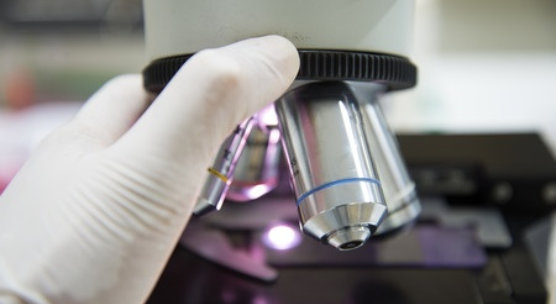Dundee researchers recognised among top young scientists in Europe
Published On Tue 27 Oct 2015 by Roddy Isles

Two researchers from the University of Dundee have been recognised as rising stars in European sciences after being named EMBO Young Investigators.
Dr Yogesh Kulathu and Dr Robert Ryan, both based in the School of Life Sciences at the University, are among 23 young researchers from across Europe to be selected to join the prestigious network.
“We welcome these young scientists to our growing network,” says Gerlind Wallon, Manager of the Young Investigator Programme. “The status of Young Investigator offers them recognition and access to a network of their peers in Europe."
The programme targets researchers under forty years of age who have established their first laboratories in the past four years. This year the programme received 174 applications. Thirteen per cent of the candidates who applied were selected and the new investigators originate from ten countries.
The Young Investigators receive a range of benefits, including an award of 15,000 Euros and the opportunity to apply for additional funds to help start their first independent research laboratories. Laboratory management and non-scientific skills training as well as PhD courses offer the young group leaders and their students the chance to develop professional skills. The scientists also receive access to core facilities at EMBL and funding for themselves and their group members to attend conferences.
Dr Ryan is a Reader and Wellcome Trust Senior Fellow in the Division of Molecular microbiology. His group specialises in understanding the signalling processes that occur within and between pathogenic bacteria during chronic infections.
“This work has potential to form promising new treatments for many emerging multiple antibiotic resistant infections which are desperately needed in clinics around the world,” said Dr Ryan. “I am delighted to get this recognition from EMBO, which again underlines Dundee’s international reputation as a centre of excellence in Life Sciences.”
Dr Kulathu is a Programme Leader in the MRC Protein Phosphorylation and Ubiquitylation Unit. The research goal of his lab is to understand how ubiquitin signals are decoded and regulated to produce distinct cellular outcomes.
“We are using a range of techniques, from structural and biochemical methods to genetic approaches in model organisms, to understand how a small protein called ubiquitin can regulate cellular function in so many different ways. The recognition from EMBO of our work is a great boost to continue our efforts in figuring out how this regulation can go wrong, leading to many different diseases.”
Dr Ryan and Dr Kulathu join a network of 365 current and past Young Investigators who represent some of the best young group leaders contributing to research in Europe and beyond.
About EMBO:
EMBO stands for excellence in the life sciences.
EMBO is an organisation of more than 1700 leading researchers that promotes excellence in the life sciences. The major goals of the organisation are to support talented researchers at all stages of their careers, stimulate the exchange of scientific information, and help build a European research environment where scientists can achieve their best work.
EMBO helps young scientists to advance their research, promote their international reputations and ensure their mobility. Courses, workshops, conferences and EMBO Press publications disseminate the latest research and offer training in techniques to maintain high standards of excellence in research practice. EMBO helps to shape science policy by seeking input and feedback from our community and by following closely the trends in science in Europe.
EMBO supports talented researchers, selected through impartial evaluation processes, to allow them to do great science. The wide scienti?c scope across the full range of life science research coupled with the broad geographical reach of more than 1700 members and associate members – some of the best researchers in Europe and around the world – positions EMBO optimally to serve Europe’s life science community.
About The MRC Protein Phosphorylation and Ubiquitylation Unit:
The MRC Protein Phosphorylation and Ubiquitylation Unit (MRC PPU), based at The University of Dundee, is a major research centre that focuses on the understanding of the biological roles of phosphorylation and ubiquitylation and how disruption of these processes cause human diseases such as neurodegeneration, cancer, hypertension and immune disorders. The MRC PPU operates as a focal point between life scientists, pharmaceutical companies and clinicians to ensure that we make a critical contribution to medical research, working together to develop new and improved strategies to treat disease.
For media enquiries contact:
Roddy Isles
Head of Corporate Communications
University of Dundee
Nethergate, Dundee, DD1 4HN
Tel: +44 (0)1382 384910
Mobile: 07800 581902
Email: r.isles@dundee.ac.uk